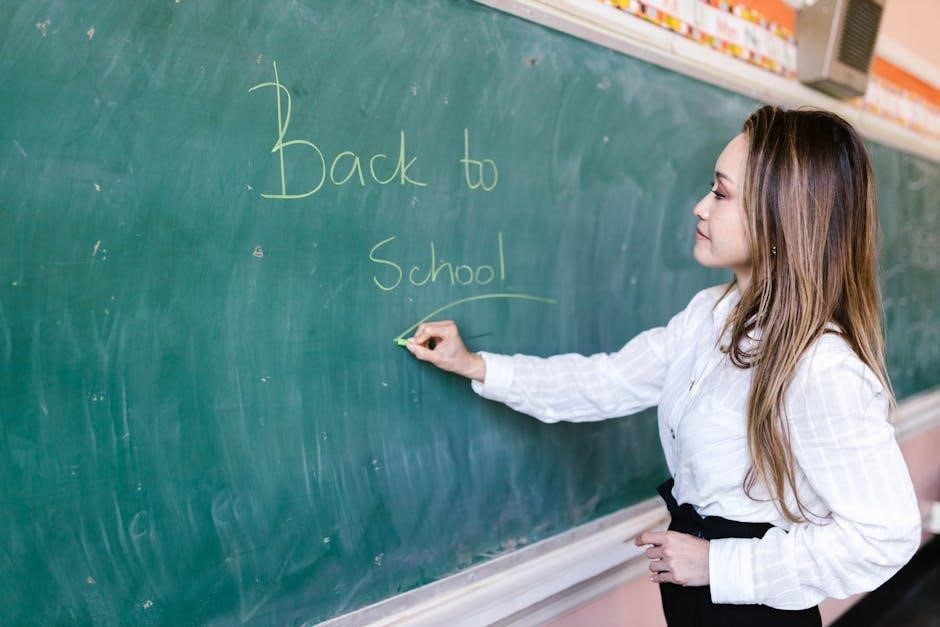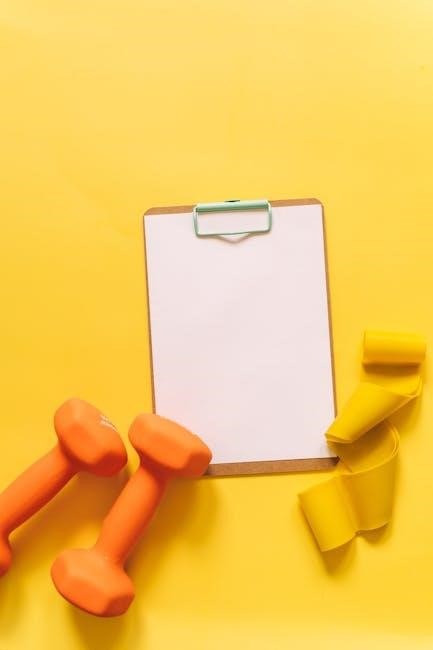
lesson plans for 1-2 year olds pdf
Lesson plans for 1-2 year olds focus on play-based learning, sensory exploration, and developmental milestones. These structured activities promote cognitive, motor, and social growth in young toddlers.
Why Lesson Plans Are Important for Toddlers
Lesson plans for 1-2 year olds provide structure and purpose, fostering developmental milestones like language, motor skills, and social-emotional growth. They offer engaging activities that promote curiosity and independence, while adapting to individual learning paces. These plans ensure consistent learning opportunities, preparing toddlers for future academic success and fostering a love for exploration and creativity from an early age.
Key Areas of Development in 1-2 Year Olds
For 1-2 year olds, key developmental areas include motor skills, language, social-emotional growth, and cognitive development. Motor skills involve improving coordination through activities like stacking blocks or scribbling. Language development focuses on expanding vocabulary and understanding simple instructions. Social-emotional growth encourages sharing, empathy, and independence. Cognitive development involves problem-solving, such as matching shapes or sorting objects. These areas form the foundation for future learning and independence.

Components of a Lesson Plan for 1-2 Year Olds
A lesson plan includes sensory play, literacy, motor skills, and music activities. It also incorporates art, story time, and outdoor exploration to foster holistic development in toddlers.
Sensory Play Activities
Sensory play activities engage toddlers’ senses through textures, colors, smells, and sounds. Activities like painting with toilet paper rolls, exploring playdough, or sorting colored rice foster curiosity and creativity. These exercises enhance tactile awareness and fine motor skills. Using household items, such as cardboard boxes or water beads, makes sensory play accessible and budget-friendly. Regular sensory experiences aid in brain development and encourage independent exploration, helping 1-2 year olds learn about their environment through hands-on interaction and discovery.
Literacy and Vocabulary Development
Literacy and vocabulary development in toddlers is fostered through interactive activities like reading aloud, singing songs, and using flashcards. Simple, engaging books with colorful images and repetitive text help build language skills. Activities such as naming objects, identifying shapes, and reciting nursery rhymes encourage verbal communication. Incorporating letter recognition and basic word associations lays the groundwork for future reading abilities, making learning fun and accessible for 1-2 year olds.
Motor Skills and Movement Exercises
Motor skills development is crucial for toddlers, focusing on activities that enhance fine and gross motor abilities. Simple exercises like pegging clothes, stacking blocks, and using flashcards improve dexterity. Movement games such as clapping, marching, and balancing help build coordination. Sensory play, like painting or sorting, also strengthens hand-eye coordination. These activities are designed to be engaging and effective, promoting physical growth and skill mastery in young children through play-based learning.
Music and Rhyme Integration
Music and rhyme play a vital role in toddler development, fostering language skills and creativity. Singing songs with actions and reciting nursery rhymes enhance memory and rhythm. Activities like clapping games and musical instrument exploration encourage auditory development. Rhymes also introduce phonological awareness, a foundation for future reading skills. Incorporating music into lesson plans creates engaging, interactive learning experiences that cater to young children’s natural love for rhythm and melody, promoting overall developmental growth.

Themed Lesson Plans for Young Toddlers
Themed lesson plans organize activities around topics like seasons, holidays, animals, and colors, creating engaging and structured learning experiences for young toddlers.
Seasonal and Holiday-Themed Activities
Seasonal and holiday-themed activities provide engaging learning opportunities for toddlers. These plans incorporate sensory play, art, music, and storytelling, aligning with developmental milestones. For example, Halloween-themed activities might include pumpkin decorating or costume parades, while Christmas plans could involve making ornaments or singing holiday songs. These activities not only foster creativity but also introduce cultural and seasonal awareness, making learning fun and relatable. They are adaptable to both home and classroom settings, encouraging exploration and skill development through festive themes.
Animal and Nature-Based Themes
Animal and nature-based themes introduce toddlers to the wonders of wildlife and the outdoors. Activities include animal sound mimicry, nature walks, and art projects using natural materials. These lessons encourage curiosity and exploration while teaching vocabulary and recognition of different animals and habitats. Sensory bins filled with leaves, rocks, or toy animals enhance tactile experiences. Such themes also incorporate stories and songs about animals, fostering a connection to the natural world and promoting early learning through engaging play.
Color and Shape Recognition Themes
Color and shape recognition themes engage toddlers in vibrant activities that stimulate visual learning. Lessons include matching games, sorting objects by color or shape, and creating art with materials like crayons and blocks. These activities enhance cognitive development and fine motor skills. Interactive play with everyday objects, such as pointing out shapes in toys or colors in nature, reinforces learning. Such themes make early education fun and accessible, laying the foundation for future academic success.

Engaging Activities for 1-2 Year Olds
Engaging activities for toddlers include art projects, sensory play, and music sessions. These experiences foster creativity, curiosity, and motor skill development through hands-on exploration and interactive fun.
Art and Craft Projects
Art and craft projects for 1-2 year olds encourage creativity and fine motor skills. Activities like finger painting, collage-making, and playdough molding are perfect for little hands. Using household items, such as toilet paper rolls or fabric scraps, can create fun textures for exploration. Sensory bins filled with rice or beans also provide tactile experiences. These projects foster imagination and curiosity while keeping toddlers engaged and excited about learning through play.
Story Time and Book Selection
Story time is a cornerstone of early learning, fostering vocabulary and language skills in 1-2 year olds. Choose sturdy, interactive books with simple, repetitive text and colorful images. Select themes that match their interests, such as animals or daily routines. Reading aloud enhances comprehension and memory, while pointing to objects encourages participation. This activity not only builds a love for reading but also strengthens bonding and curiosity about the world around them.
Outdoor Play and Exploration
Outdoor play is essential for 1-2 year olds, promoting gross motor skills and sensory development. Activities like walking, ball games, and exploring nature encourage curiosity and physical growth. Simple tasks, such as pegging clothes on a line or using cardboard boxes, enhance coordination and creativity. These experiences foster a connection with the environment, supporting overall development while providing fresh air and active learning opportunities tailored to their age and abilities.
Benefits of Structured Lesson Plans
Structured lesson plans enhance learning through play, foster social-emotional growth, and prepare toddlers for preschool and future academic success.
Enhanced Learning Through Play
Play-based activities in lesson plans for 1-2 year olds foster curiosity and creativity, encouraging toddlers to explore and learn naturally. Sensory play, art projects, and music integration stimulate cognitive development and motor skills. These engaging experiences help toddlers connect ideas, solve problems, and build foundational knowledge through interactive and enjoyable methods. Playful learning environments support individual growth and prepare young children for lifelong learning adventures.
Improved Social and Emotional Development
Lesson plans for 1-2 year olds emphasize activities that promote social and emotional growth. Group play fosters sharing, cooperation, and friendship skills, while sensory and art projects encourage self-expression. Structured yet flexible routines help toddlers develop emotional regulation, empathy, and confidence. Caregivers guide these interactions, modeling positive behaviors and providing support, which strengthens a child’s ability to navigate social situations and build meaningful relationships.
Preparation for Preschool and Beyond
Lesson plans for 1-2 year olds lay the groundwork for future academic success. Activities focus on foundational skills like literacy, numeracy, and motor development, helping toddlers transition smoothly to preschool. Structured play introduces routines and independence, while sensory and art projects enhance problem-solving abilities. These early experiences build confidence and curiosity, equipping children with essential tools to thrive in more formal educational settings and beyond.

Tips for Parents and Educators
Utilize flexible schedules, adapt activities to individual needs, and encourage parental involvement. Incorporate sensory play, literacy, and motor skills exercises for holistic development. Use downloadable PDF templates for structured planning and explore online communities for additional resources and support.
Adapting Activities to Individual Needs
Adapting activities ensures each child engages effectively, considering their unique developmental pace and interests. Offer varied sensory experiences, simplify tasks for younger toddlers, and incorporate diverse skills like literacy and motor exercises. Using tools like lesson plan templates allows customization, ensuring activities cater to individual learning styles and abilities. Parents and educators can adjust materials and complexity to support each child’s growth meaningfully, fostering a tailored learning environment.
Creating a Flexible Schedule
A flexible schedule allows for spontaneity and adapts to toddlers’ unpredictable rhythms. Incorporate short, engaging activities with built-in breaks, ensuring a balance between structured play and free exploration. Parents and educators can tailor timelines to suit individual energy levels and interests, fostering a relaxed yet productive environment. This approach encourages natural learning and accommodates the dynamic nature of young children’s attention spans and developmental needs.
Encouraging Parental Involvement
Engaging parents in their child’s learning enhances development and strengthens the home-school connection. Provide accessible resources like PDF lesson plans and activity guides for parents to use at home. Encourage participation in sensory play, storytelling, and simple crafts. Regular communication and collaborative goal-setting foster a supportive environment, ensuring consistency and reinforcing the child’s progress. This partnership empowers parents to actively contribute to their toddler’s educational journey.

Free Resources for Lesson Plans
Discover free lesson plan resources for toddlers, including downloadable PDF templates, online communities, and curriculum guides, designed to support early childhood development through engaging activities.
Downloadable PDF Templates
Free downloadable PDF templates for 1-2 year olds offer structured lesson plans tailored to early childhood development. These templates are customizable to fit various teaching styles and developmental needs. They often include activities like sensory play, alphabet recognition, and motor skills exercises. PDF templates save time and provide a clear format for organizing daily or weekly lesson plans. Many resources also include examples of engaging activities, making it easier for parents and educators to prepare young toddlers for preschool and beyond.
Online Communities and Forums
Online communities and forums offer valuable resources for lesson plans tailored to 1-2 year olds. Educators and parents can share ideas, download PDF templates, and access themed activities. Websites like Education World and kidactivitieswithalexa.com provide forums where users can exchange tips and materials. These platforms often feature discussions on sensory play, literacy, and motor skills development, making them a great support system for creating engaging lesson plans for young toddlers.
Curriculum Guides and Workbooks
Curriculum guides and workbooks provide structured resources for teaching 1-2 year olds. These materials often include themed activities, sensory play ideas, and developmental milestones. Workbooks like “My First School: One-Year-Old Curriculum” offer comprehensive lesson plans tested by educators and parents. They focus on skills like vocabulary, motor development, and creativity, ensuring a balanced approach to early childhood education.
Lesson plans for 1-2 year olds are essential for fostering early childhood development through play-based learning. These structured activities promote cognitive, motor, and social skills while encouraging creativity and curiosity. With resources like workbooks and curriculum guides, parents and educators can provide engaging experiences tailored to toddlers’ needs. By leveraging these tools, caregivers can help little ones thrive, preparing them for preschool and beyond with confidence and joy.


Leave a Reply
You must be logged in to post a comment.